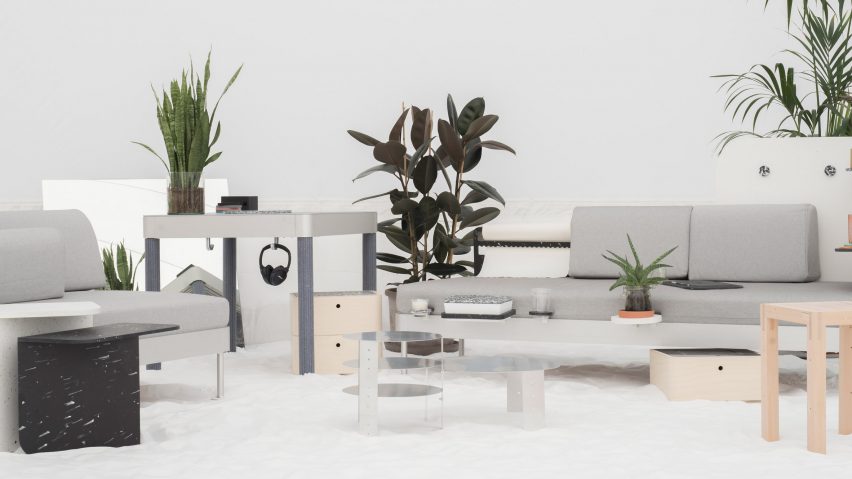The Space10 innovation lab has teamed with open-source manufacturing platform Opendesk to create workspace attachments for IKEA's Delaktig system by Tom Dixon.
Created by a team of seven designers, the attachments turn the sofa bed into work furniture, potentially extending its product cycle.
Ranging from tabletops to integrated storage, dividers and cup-holders, the products are all composed of materials that have been locally sourced or recycled from waste. Table legs are made from jeans, coffee tables out of yogurt pots, and toolboxes of waste wool.
However, because the products are open-source, they can be manufactured around the world using any local and sustainable materials that are also CNC-machinable – such as plywood, recycled plastics, pine, aluminium and recycled textile boards.
"This collaboration between Space10 and Opendesk explores the brave new world of design and manufacturing," said Guillaume Charny-Brunet, director of innovation at Space10.
"While open-source design is still an emerging concept, the potential is enormous," he continued. "Instead of shipping physical products in large containers, we can send design as digital files to be downloaded, customised and made anywhere – reliably, repeatedly and on-demand and even using materials that can be sourced, recycled or grown locally and sustainably."
Revealed at this year's Milan design week, the Delaktig bed was conceived as an open-source "platform for living" designed to be adapted through third-party add-ons. Architect and Opendesk founder Joni Steiner describes it as "visionary".
"I think there's going to be a shift from a monologue to a dialogue generally in design, where architects and designers will really see that the value is in working with communities or clients," Steiner told Dezeen.
"The next generation of designers are going to be natively thinking like that, and I think it's visionary of Tom Dixon to start bringing people into that conversation with a project like this."
Space10 and Opendesk's open-source designs for IKEA were unveiled at Made In Space, a three-day festival held at Space10 in Copenhagen's meatpacking district. On from 15 to 17 June, it explores alternative futures through a series of talks, workshops and seminars.
Opened in November 2015 and funded by IKEA, Space10 is a research hub and exhibition space in Copenhagen that is used to test product prototypes and find ways of boosting consumers' wellbeing.
Its collaborator on this project, Opendesk, is a young London-based open-source office furniture platform that allows customers to download plywood and laminate furniture designs. These can then be manufactured and customised by local fabricators on a CNC machine.
Because most of the logistics, shipping costs and retail price markup are eliminated, Opendesk says the price of its furniture is close to that of mass-produced goods. For each purchase on its site, Opendesk distributes the income between independent designers, the platform and local fabricators.
Their new "hacked" designs were created during a three-week residency at the Space10 workshop by the seven designers, who Opendesk invited to imagine products for flexible workspaces. Each piece lives as a digital file that can be downloaded anywhere in the world and made locally on a CNC machine.
"The Delaktig project challenged us to work beyond what we're comfortable with, which is plywood," Steiner told Dezeen. "Plywood makes sense for our business because it's available everywhere, it's the most universal material. But what we'd really like to do is empower loads of small-scale independent manufacturers like Smile Plastics and Solidwool."
The designs include "Delaktable", a desk designed by Joni Steiner and his brother David Steiner. The table's legs and top are made from a recycled denim material produced by Really – a new brand, bought by Danish textile company Kvadrat, that upcycles end-of-life textiles into solid boards.
A toolbox designed by Josh Worley, content lead at Opendesk, is made from Solidwool – a composite bio-resin and wool material similar to fibreglass that is made in Devon, England. The Tool Box is mounted on small castors and designed to slot neatly underneath the Delaktig bed.
Designed to clip onto Delaktig's frame, the Links accessories allow IKEA classics to be integrated into the bed design. Created by electronics designer Bruno Schillinger and made out of a recycled yogurt pot material produced by Smile plastics, the links can be used to create cupholders, paper dispensers, shelves and plant-pot holders.
Italian designer Chiara Onida has designed a set of nesting tables made from the same yoghurt pot material. Called Alae, the tables' design references Delaktig's rounded corners and cushions.
The Lato privacy screen, created by both Onida and Worley and made from Kvadrat's Really board, is designed to curve around the bed and clip onto its frame.
In addition, designers and Cranbrook Academy graduates Emil Froege and Jesse Yang created a duo of adjustable structures that can be used as coffee tables or seating – one made made from CNC-cut Oregon Pine and the other from CNC-cut and folded sheets of aluminium.
Space10 and Opendesk say the add-ons will be made available via Opendesk's platform in February 2018 to coincide with the launch of the Delaktig system.
Other projects by Space10 include a visual exploration into what the next 20 years of food design might hold for the meatball, while last year, Opendesk launched a service aimed at disrupting the contract furniture industry by allowing businesses to order locally manufactured products that can be delivered and installed in just 14 days.
Photography by Niklas Adrian Vindelev.

